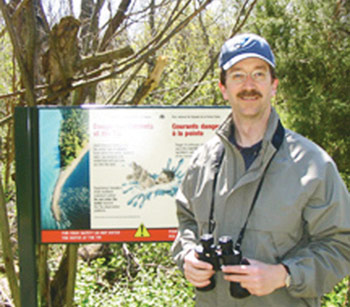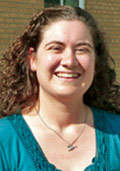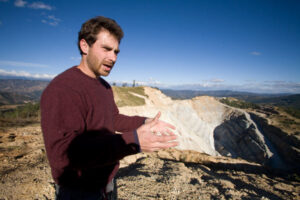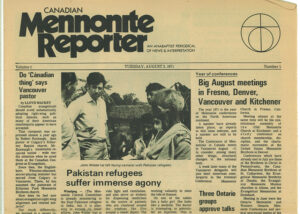Sustainable communities require long-term planning
David Neufeld of Winnipeg, Man., has a long history with both Mennonite and secular efforts to address environmental issues. He has served on the Creation Care Council of the Mennonite Creation Care Network (MCCN) since its inception. He was also part of the Mennonite church’s Environmental Task Force that existed from 1991 through 2001, and assisted with the ad hoc committee that designed MCCN. On the job as a community planner, he champions long-term thinking. Heidi Martin conducted the interview for the MCCN newsletter.
Martin: Describe your job responsibilities as the director of community planning for the government of Manitoba.
Neufeld: I have worked for the government in the area of land and water policy for 25 years. At present, I manage regional offices across Manitoba that provide advisory and technical services to cities, towns and rural municipalities. Our job is to help communities put together long-range plans for managing growth [housing, industry, commercial, recreational, institutional].
Martin: How has your work made a difference in Manitoba or in the lives of rural community members?
Neufeld: We encourage communities to take a more sustainable approach to land use planning, and to realize that if it is not planned properly it will cost everyone, in terms of impacts on the environment as well as social and economic costs.
Martin: Are there projects that were particularly successful?
Neufeld: We have a pilot project in a small mining town in northern Manitoba called Snow Lake. For the first time the local citizens are engaged in a discussion of their future and also bringing together considerations of infrastructure, housing and environment in one process.
Martin: Name some challenges and highlights from your position.
Neufeld: Short-term thinking is a chronic problem we encounter with some local councils and landowners. Many feel they should have the right to subdivide their land and sell it for whatever purpose someone is willing to use it for. The true cost of development is often underestimated. It also is difficult to quantify some of these costs. For example, the impact of approving too much development around small lakes—or allowing scattered rural subdivisions—often only becomes apparent many years after they are approved. At that point it is too late or extremely costly to remedy the situation.
Martin: How does your work integrate faith and your personal interest in creation care?
Neufeld: I went to university to study the environment because of an abiding interest in how we can motivate society and individuals to relate to, and interact with, the ecosystems of which they are a part in non-destructive ways.
I do not work for a faith-based organization. Separation of church and state is a fact of life, and probably a good thing. Having said that, one of my goals in high school was to work for the government because it is not only driven to maximize short-term profits. The public interest is much broader than that. I have served governments of all political stripes, and I don’t always agree with their values and aspirations. But as long as I can do my job with a clear conscience, I will continue to try and contribute in this way. We need caring and faithful stewards in every sector: in government, the private sector and the non-profit sector.
Meanwhile, there have been ample opportunities to reflect on creation care from a faith perspective. I minored in religious studies at university, got involved in helping Mennonite Central Committee Canada adopt its first policy on environmental stewardship, did workshops at church conferences, and so forth, so there was little gap between my personal beliefs and my work orientation.
Martin: Looking ahead, do you have particular goals in the area of creation care that you would like to accomplish at work or in your home life?
Neufeld: I am conscious of the need to fight cynicism. When you have worked as long as I have in a government setting, one can get discouraged or simply give in to the many barriers and difficulties of achieving good policy.
In a follow-up e-mail, Neufeld notes that congregations can expect to receive a poster from Mennonite Church Canada in October supporting the MCCN’s Shades of Green Campaign (mennocreationcare.org), saying, “We want to see 40 congregations across Canada share what they have been doing to be a little greener in their local context to care for God’s creation.”
Pursuing tough questions in Kenya
How do you get people to care about the environment? How do you get them to change their behaviour? How do you change a society?
These are the kinds of questions that intrigue Joanne Moyer, who has served on the MCCN Creation Care Council since its inception. Moyer lives in Winnipeg, and is currently a Ph.D. student in natural resource and environmental management at the University of Manitoba.
“I get fired up thinking about what drives people to care and to act,” Moyer says. “This touches on philosophy and religion and culture and psychology and education, and lots of other things as well.”
Moyer’s long-term goal is to teach in an academic setting. She says she explored working for a variety of non-profit organi-zations on environmental issues, but found that most of these jobs involved organizing, while she enjoyed reading, writing and thinking about environmental issues. “I hope I can help practical-minded people think about things that will be helpful to them in their work,” Moyer says.
Currently, Moyer is directing her attention towards Kenya, where she is researching faith-based environmental organizations for her dissertation. Her work is part of a project that assesses how people who participate in environmental assessment learn from the process and apply their learning to other settings. Kenya had a particular draw for Moyer because her family lived in East Africa for two years when she was a child.
Moyer’s first impressions are that the ways Africans understand their churches are very different from the ways many westerners perceive churches. “In countries like Kenya, where social institutions aren’t strong and political institutions are often corrupt, the church is the only organization that people trust,” she observes.
Religious slogans are everywhere and churches are highly respected. When church leaders tell the community to think about, or act on, a particular problem, they will. On the other hand, many missionaries to Kenya have taught a gospel focused primarily on an otherworldly salvation, and a theology that respects creation is not a given.
Care of Creation Kenya is one group that has impressed Moyer. Its purpose is to bring the message of environmental stewardship to church leaders and it hosts workshops for them. At a recent workshop for Presbyterian clergy, Moyer reports that participants began by saying they didn’t know why they were there. At the end, a representative came forward and said, “We have only one thing to say: We repent.”
Care of Creation Kenya has also addressed deforestation by developing a tree nursery with the largest collection of indigenous species in the country.
Moyer is returning to Kenya this month to spend time with two other groups: Arocha Kenya and the development arm of the Quaker Mission.










Leave a Reply
You must be logged in to post a comment.